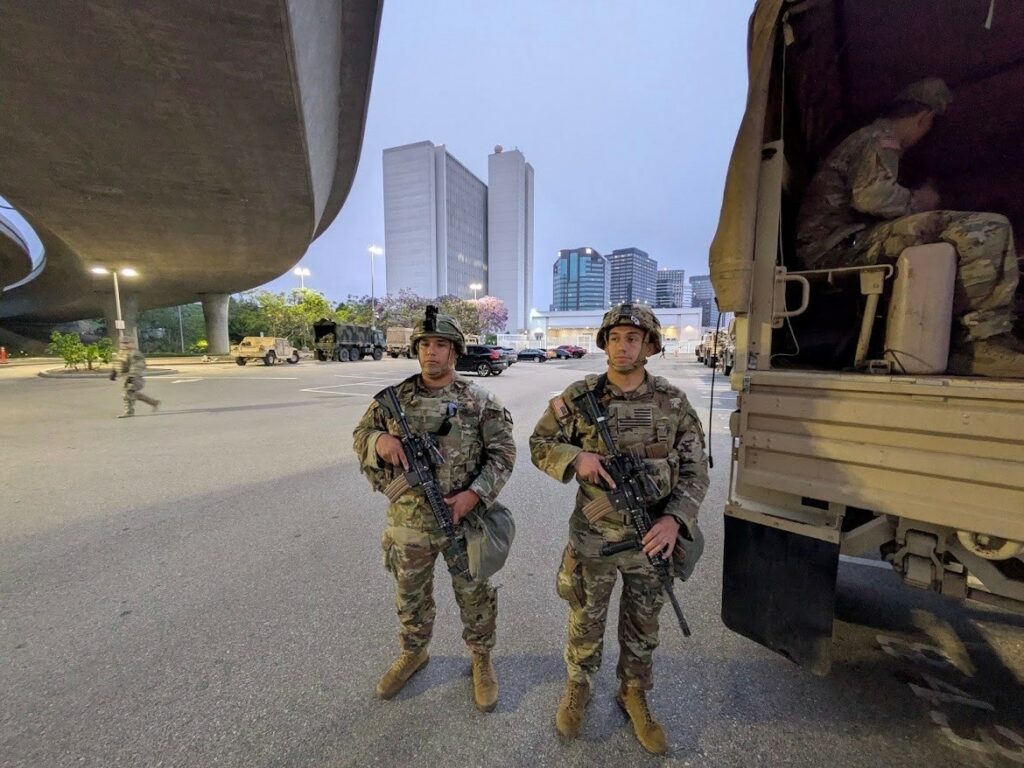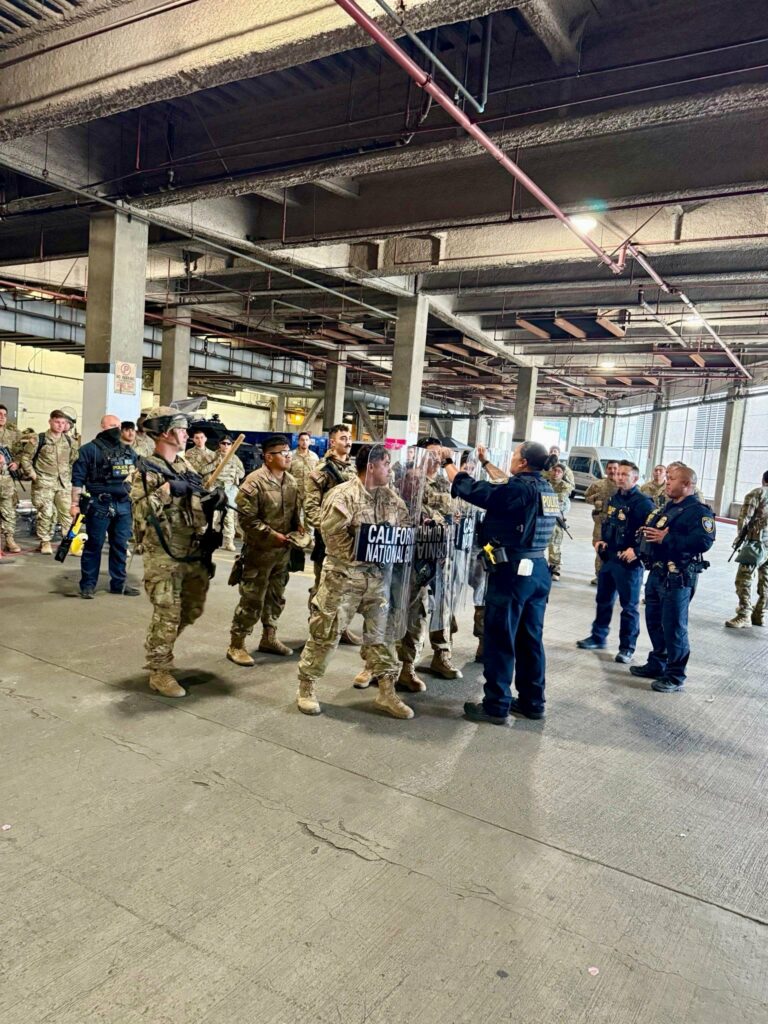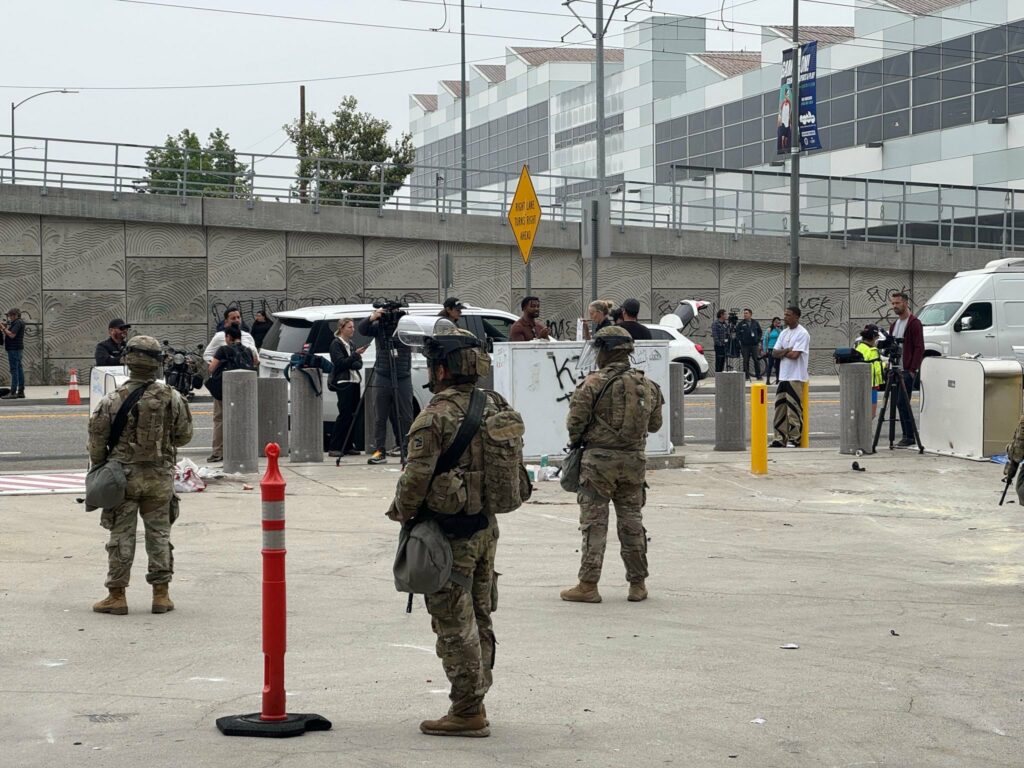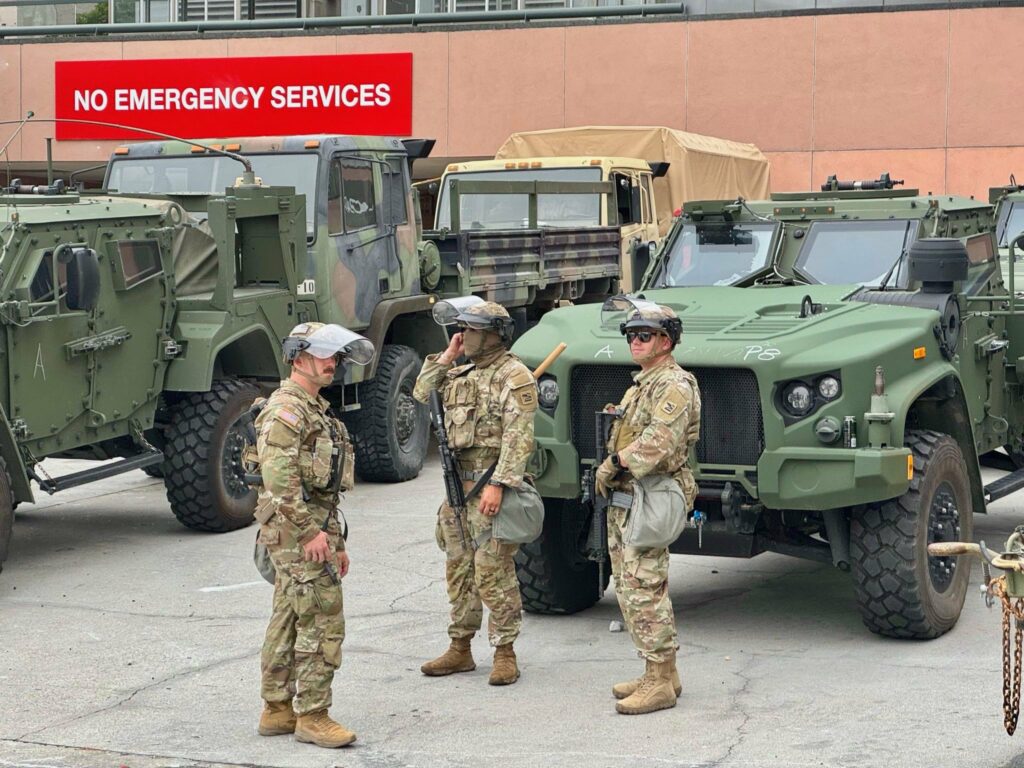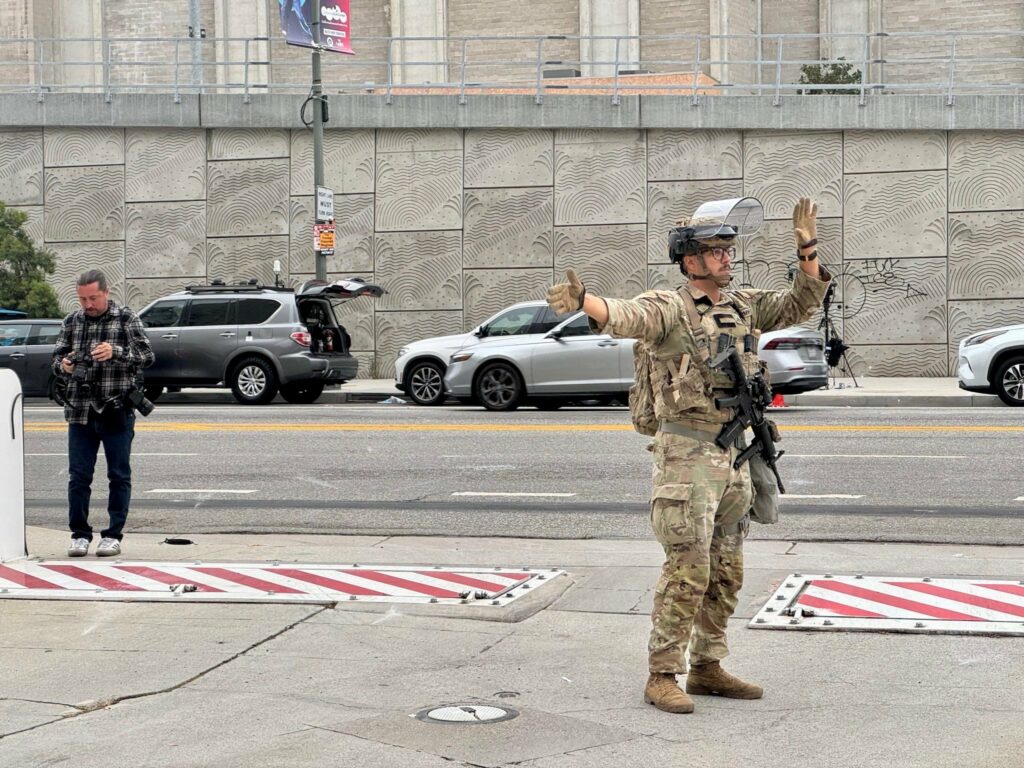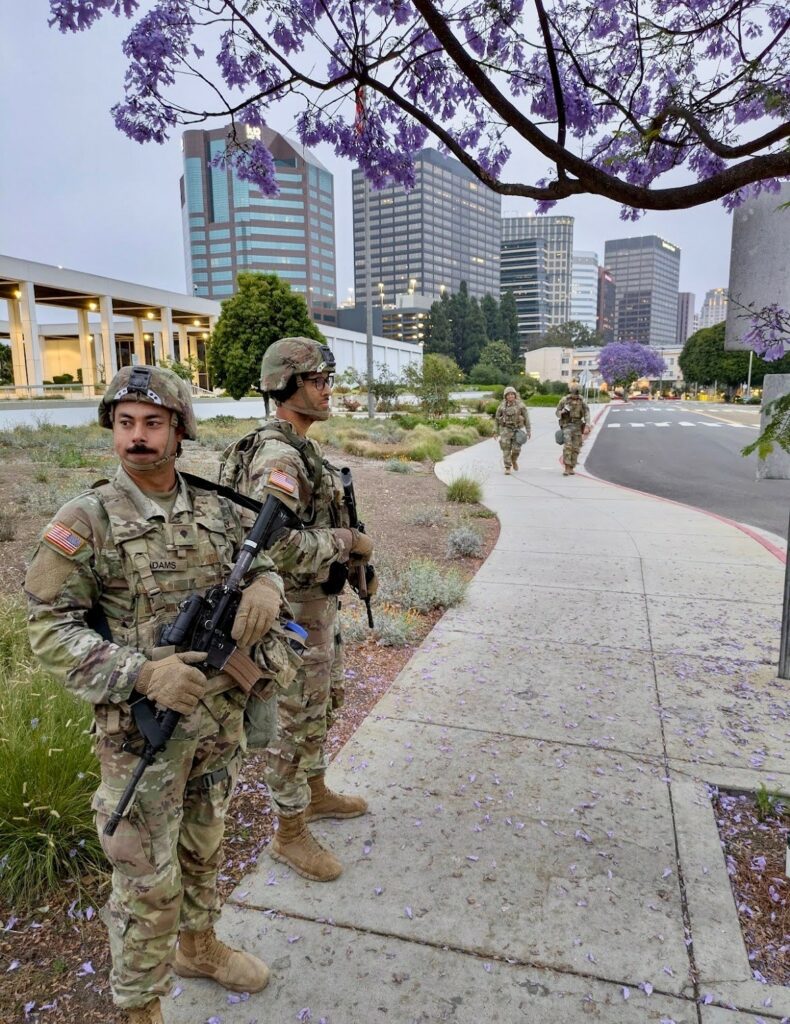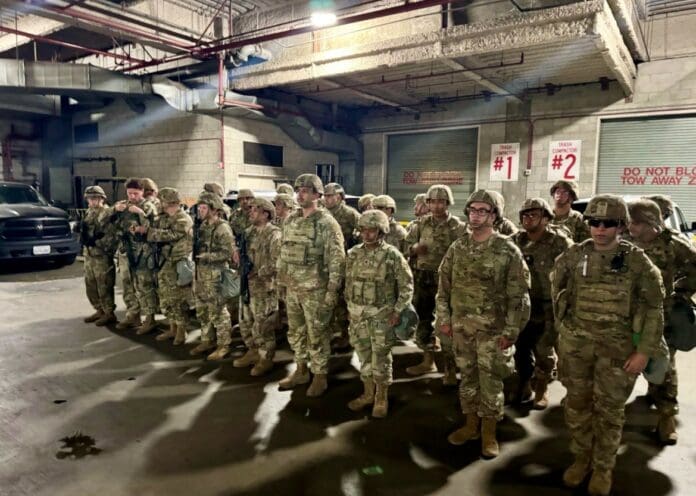Federal troops arrive following riots, unrest, and arrests of undocumented immigrants with violent records
In response to growing tensions, riots, and threats to federal property, the federal government has deployed National Guard troops under a directive signed by President Donald Trump. The move comes on the heels of arrests involving more than a dozen undocumented immigrants, whom the Department of Homeland Security (DHS) described as among the “worst of the worst” criminal offenders.
Saturday morning, the situation reached a boiling point as a protest erupted in Paramount, near a Home Depot on Paramount Boulevard. The demonstration began peacefully around 10:15 a.m. but quickly escalated after reports emerged that federal agents were staging operations in office spaces adjacent to the store. L.A. County Sheriff Robert Luna confirmed that while federal law enforcement was active in the area, his department’s role was limited to traffic and crowd control.
In a statement posted Saturday to social media, Los Angeles County Supervisor Lindsay Horvath condemned the federal immigration raids and resulting unrest, asserting that the situation has devastated communities and upended lives. “People were living their lives — working, raising kids, seeking care — until ICE came to tear it all apart,” she wrote. “Now families are in hiding, workers are afraid to leave home, and children are wondering if their parents will come back.”
Horvath criticized the actions as politically motivated, calling them an abuse of power aimed at punishing immigrants and making examples of vulnerable neighbors. She placed direct blame on the federal administration for creating and escalating the chaos, adding, “They instigated it. They’re taking advantage of vulnerable people — and then blaming them for the fallout. We won’t let this stand.” Horvath urged residents to know their rights, protect one another, and stay safe, linking to the county’s official resource: oia.lacounty.gov/kyr/.
Later that day, tensions flared when objects were reportedly thrown at deputies and federal agents. Video footage shared on social media and news broadcasts captured scenes of looting, vehicles set ablaze, and tear gas deployed as authorities responded with less-than-lethal munitions to disperse the growing crowd.
As violence escalated, the Sheriff’s Department declared the Paramount protest an unlawful assembly. By Saturday evening, similar unrest prompted the Los Angeles Police Department’s Central Division to declare another unlawful assembly downtown at 9:05 p.m., warning demonstrators to disperse or face arrest.
On Sunday morning, the deployment was carried out by the 79th Infantry Brigade Combat Team (IBCT) of the California National Guard. Approximately 300 soldiers were stationed at three undisclosed locations across the greater Los Angeles area. Their stated mission is to protect federal property and personnel in coordination with the Department of Homeland Security.
According to U.S. Northern Command (USNORTHCOM), “elements of the 79th Infantry Brigade Combat Team from the California National Guard have begun deploying to the Los Angeles area, with some already on the ground. Additional information will be provided as units are identified and deployed.”
On June 7, President Donald J. Trump issued a memorandum invoking 10 U.S.C. 12406, a federal statute authorizing the activation of the National Guard to respond to domestic threats. Citing recent violent protests, threats to immigration detention centers, and interference with federal law enforcement operations, the President characterized the acts as “a form of rebellion against the authority of the Government of the United States.”
The President’s directive authorized the temporary federalization of at least 2,000 National Guard personnel for a period of 60 days or at the discretion of the Secretary of Defense. The order also permits the use of regular Armed Forces personnel to support operations deemed necessary to safeguard federal missions.
“To carry out this mission, the deployed military personnel may perform those military protective activities that the Secretary of Defense determines are reasonably necessary to ensure the protection and safety of Federal personnel and property,” the statement read.
Simultaneous to the National Guard’s deployment, ICE released details of an extensive enforcement operation in Los Angeles, which they claim targeted undocumented immigrants with violent criminal records. According to the June 8 DHS press release titled “ICE Captures Worst of the Worst Illegal Alien Criminals in Los Angeles Including Murderers, Sex Offenders, and Other Violent Criminals,” the arrests aimed to remove individuals posing significant threats to public safety.
“These rioters in Los Angeles are fighting to keep rapists, murderers, and other violent criminals loose on Los Angeles streets,” said Assistant Secretary Tricia McLaughlin. “Instead of rioting, they should be thanking ICE officers every single day who wake up and make our communities safer.”
The DHS identified and named a few individuals arrested in the operation:
- Cuong Chanh Phan, 49, from Vietnam: Convicted of second-degree murder, sentenced to 15 years to life.
- Rolando Veneracion-Enriquez, 55, from the Philippines: Convictions include burglary, sexual penetration with a foreign object with force, and assault with intent to commit rape; sentenced to 37 years in prison.
- Lionel Sanchez-Laguna, 55, from Mexico: Multiple convictions in Orange, CA, including discharging a firearm at a dwelling, battery, child cruelty, DUI, and assault with a semi-automatic firearm; various sentences including jail time and probation.
- Armando Ordaz, 44, from Mexico: Criminal history includes sexual battery, receiving stolen property, and petty theft in Los Angeles and Norwalk.
- Francisco Sanchez-Arguello, 38, from Mexico: Arrested for grand theft larceny and possession of a prohibited weapon.
- Jose Gregorio Medranda Ortiz, 42, from Ecuador: Convicted of conspiracy to possess and distribute cocaine while on a vessel; sentenced to over 11 years in prison.
- Victor Mendoza-Aguilar, 32, from Mexico: Convicted of multiple offenses in Pasadena, including drug possession, assault with a deadly weapon, and obstructing a public officer.
- Delfino Aguilar-Martinez, 51, from Mexico: Convicted of assault with a deadly weapon causing great bodily injury in Los Angeles.
- Jose Cristobal Hernandez-Buitron, 43, from Peru: Convicted of robbery; sentenced to 10 years in prison.
- Jordan Mauricio Meza-Esquibel, 32, from Honduras: Arrested for drug distribution (heroin and cocaine) and domestic violence.
- Jesus Alan Hernandez-Morales, 26, from Mexico: Convicted of conspiracy to transport an illegal alien in Las Cruces, New Mexico.
Full press release and mug shots are available here.
ICE officials stated that all individuals are being processed for removal, and several face further federal charges.
Los Angeles Mayor Karen Bass condemned the deployment of federalized troops, calling it “a chaotic escalation” and warned of the emotional toll on the city’s immigrant communities.
“This morning, President Trump deployed the National Guard into Los Angeles,” Bass posted on social media. “The fear people are feeling in our city right now is very real — it’s felt in our communities and within our families and it puts our neighborhoods at risk. This is the last thing that our city needs, and I urge protestors to remain peaceful.”
Bass emphasized that she had been in communication with immigrant rights advocates and local law enforcement, reiterating, “Los Angeles will always stand with everyone who calls our city home.”
The situation in Los Angeles is part of a broader federal crackdown on undocumented immigrants with criminal histories and an increasing focus on public safety as a justification for immigration enforcement. The political and legal tensions between state and federal authorities are particularly visible in California, where state and local policies have often diverged from federal immigration priorities.
California officials, including Governor Gavin Newsom, have repeatedly voiced opposition to ICE operations conducted without local coordination. The latest actions by federal law enforcement — and the military reinforcement — are likely to reignite those debates.
Law enforcement has used less-than-lethal munitions in some instances to disperse crowds. Officials say they are working to prevent further escalation and are encouraging community members to stay calm and lawful in their expression of dissent.
The federal deployment is expected to remain in effect for up to 60 days unless altered by the Secretary of Defense. Additional troops could be sent, and further ICE operations are reportedly planned for Southern California in the coming weeks.
As the situation develops, the tension between local governance, federal authority, and community sentiment remains at the forefront of national conversation. The coming days may define not only the outcome of these enforcement actions, but the broader relationship between state and federal powers in the arena of immigration law and public safety.
This is a developing situation, and we will provide updates as more information becomes available.This is a developing situation, and we will provide updates as more information becomes available.
